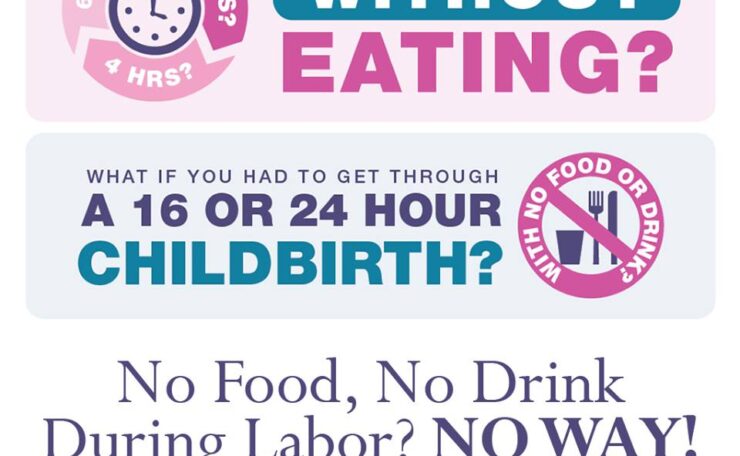Why Can’t You Eat While in Labor?
Eating during labor is still a debate among healthcare providers, hospitals and birthing centers. It is still up for debate because of the possibility of spiration while under anesthesia which became a concern during the 1940’s. New studies state that low-risk pregnant moms may  experience benefits if they are able to eat and drink while in labor.
experience benefits if they are able to eat and drink while in labor.
Research indicates that who can and can’t eat during labor can be determined on a case-by-case basis rather than a blanket policy.
Why Can’t I Eat While in Labor?
If you are put under anesthesia during your labor, you may be at risk of breathing in small bits of food which can lead to problems like pneumonia.
The Research Behind Fasting During Labor
Fasting for pregnant moms began being requested after researchers found that those who were put under general anesthesia had an increased risk for aspiration. This came about after a 1946 study when 44,000 pregnancies in a New York hospital were reviewed. 66 of these cases were hypothesized there was a risk for pneumonia if stomach contents were aspirated. It was determined that food aspiration during delivery would not actually lead to pneumonia.
However, it was determined that by avoiding food and drink during labor you could reduce stomach volume decreasing the risk of problems from stomach acid aspiration while under general anesthesia.
When Should I Stop Eating During Labor?
Most hospitals will let you consume clear liquids during early labor. Some birthing centers do not allow drinking or eating at all once you are in their care for delivery.
Benefits of Eating During Labor
General anesthesia has been replaced with regional pain management. If you elect for an epidural for pain management, you are awake so aspiration is not a concern. Without risk of aspiration, the question of whether or not you should drink and/or eat during labor becomes an issue. This concern has begun being explored.
Hydration
ACOG notes that low-risk moms in labor should be permitted to drink clear liquids. There is the possibility during labor to become dehydrated. Many prefer to avoid an IV so taking fluids and maintaining hydration can prevent an IV altogether.
Energy
A person in labor uses an amazing amount of energy in order to give birth. Consuming extra calories during labor can give you the extra boost you need to sustain yourself through coping with contractions and eventually pushing.
Stress Reduction
There are many pregnant moms that prefer to eat and drink while in labor. Studies have shown that restrictions on consumption can lead to increased stress in such cases. Eating and drinking for some can increase comfort during labor.
Shorter Labor
Research that compared fluid and food intake among thousands of laboring moms found that fewer restrictions translated into shorter deliveries. It also stated there was no increase in vomiting due to eating or drinking during labor.
What to Eat During Labor
Those with low-risk pregnancies who are allowed to eat and/or drink during labor will still find there are recommendations from which they could benefit. It’s possible to experience nausea as your labor progresses. So keeping food and drink intake light may help.
At Home
If you are at home and in early labor, choose foods that are easy to digest without excessive spice or fat.
- Consume complex carbohydrates for energy purposes – brown rice, multigrain crackers or bread, whole wheat pasta, noodles in soup or oatmeal
- Frozen fruit like berries and grapes may provide a cool treat
- Pick proteins to maintain energy levels – nut butters, Greek yogurt, cheese, protein shakes or smoothies with protein
At Hospital or Birthing Center
There may be policies in place for a recommended diet to follow. This could include limiting to these options:
- Clear broth
- Cooked fruits
- Crisp toast
- Fruit juice
- Lightly cooked eggs
- Plain biscuits
- Tea
If you are able to bring your own food, easy-to-digest energy sources and simple carbs can be helpful. Honey sticks, or energy gels are great choices. Anything you have at this time should be easy to digest.
As your healthcare provider ahead of time about their food and drink policies so there are no surprises. For help with pregnancy, labor and delivery, get in touch!





